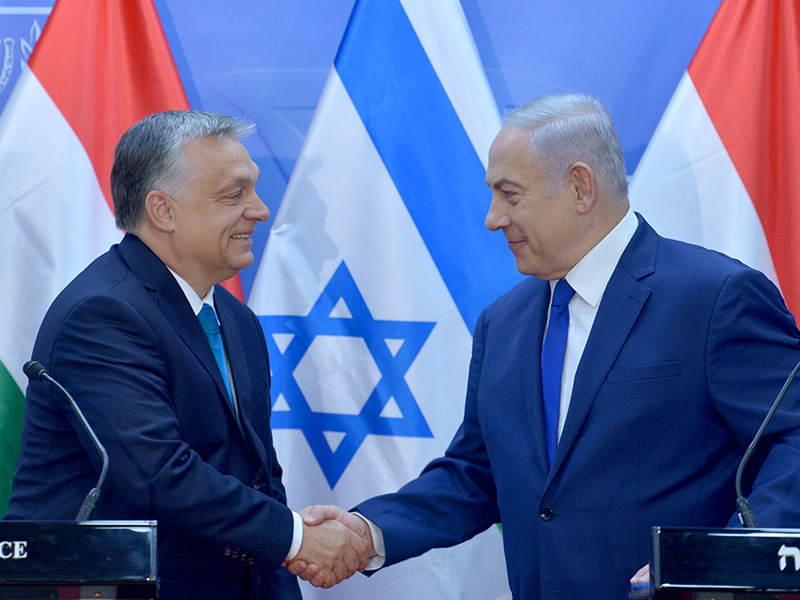PM Netanyahu meets with Hungarian PM Orbán
-
-
7/19/2018
GovXShortDescription
The threat of radical Islam is real. Of all the sources of militant Islam, Iran is the greatest threat to our common civilization. And by being here, at the frontline of the battle against radical Islam, in many ways Israel is defending Europe.
-
-

 PM Netanyahu with Hungarian Prime Minister Viktor Orbán.
Copyright: GPO/Kobi Gideon
PM Netanyahu with Hungarian Prime Minister Viktor Orbán.
Copyright: GPO/Kobi Gideon
|
GovXContentSection
(Communicated by the Prime Minister's Media Adviser)
Prime Minister Benjamin Netanyahu, this morning (Thursday, 19 July 2018), at the Prime Minister's Office in Jerusalem, met with Hungarian Prime Minister Viktor Orbán. The two met privately and then with their entourages.
Prime Minister Netanyahu made the following remarks at the start of the meeting:
"Prime Minister Orbán, Viktor, welcome to Jerusalem to you, your delegation, your wife.
This is a reciprocal visit to my wonderful visit to Hungary. It was magnificent. Very impressive seeing your country, the great development that is taking place but also seeing the things that are so evocative to the history of our people beginning with the birthplace of our great prophet behind you, Theodor Herzl. His birthplace, the beginning of Zionism, the reason that we are all here. It all began in Budapest.
We spoke also of the tragedies that afflicted the people, the Jewish people on the soil of Hungary and I heard you speak, as a true friend of Israel, about the need to combat antisemitism. Anti-Semitism has been the scourge of the Jewish people for thousands of years. It claimed horrible tragedies, culminating in the greatest tragedy of them all – the Holocaust in the 20th century. It must be fought continuously, relentlessly, unambiguously.
In July, Hungary sponsored a statement in the UNHRC condemning anti-Semitism. In March, you inaugurated the renovated synagogue in Subotica. You said it was, 'a moral duty that Jews live without fear and practice religion freely.' You allocated 10 million forints for the renovation of synagogues. I think that the task is always before us because anti-Semitism continuously rears its head but these actions point to a positive direction, which we encourage all our friends to continue throughout Europe, throughout the world.
In addition to preserving the memory of the past, Hungary and Israel are seizing the future. We are not big countries but big in aspiration, big in talent, big in intellectual capability and we are developing new industries. For example, Israel today has a car industry. You have a car industry. We don’t call it exactly a car industry but it is the software that makes transportation change radically and this is happening in so many other fields. I see the tremendous possibilities of cooperation between our two economies, between our entrepreneurs, between our businesspeople and we indeed cooperate in so many areas, in technology, in commerce, in tourism, in security and much more.
We both understand that the threat of radical Islam is a real one. It could endanger Europe, It could endanger the world. It certainly endangers us and our Arab neighbors. We believe that of all the sources of militant Islam, Iran is the greatest threat to our common civilization. And by being here, in this county here, at the frontline of the battle against radical Islam, in many ways Israel is defending Europe.
I want to thank you for defending Israel. You have stood up for Israel time and time again in international forums. It is deeply appreciated and it is important, and important goal of Israeli foreign policy to change not only our bilateral relations with so many countries and indeed our relations are flourishing as never before. It is also to change the way Israel is treated in international forums and on this Hungary has led the charge many, many times and I thank you for it.
I want to thank you also for hosting the Visegrád Group during my visit in Hungary and affording me the opportunity to meet with your colleagues. We believe this is an important relationship, an important association, which we intend to strengthen and develop.
We can say next year or possibly even this year in Jerusalem. Welcome friend."
-
-
-
-
-
-
-
-
-
-
-
-
-
-
-
-
-
-
-